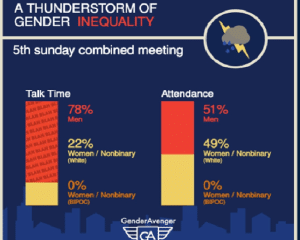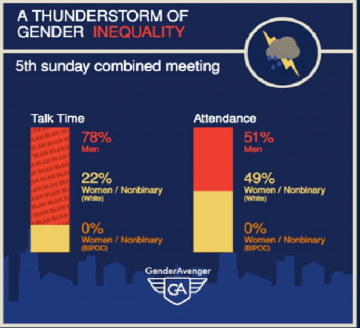Guest Post by Bryn. Bryn is a transplant to New England who loves her small ward nestled in the mountains. She teaches composition, takes her kids to martial arts and cub scouts, and plays Wingspan as often as she can.
On a regular fifth Sunday earlier this year, the Bishop and Elder’s Quorum President of my very small ward gathered the adults together to have a conversation about recent organizational shifts. They explained that more responsibility had been moved from the Bishop to the Elder’s Quorum and Relief Society. They asked us all to consider how we are building Zion in our little ward.
About ten minutes into the meeting, I realized that our Relief Society president was sitting in the audience, not one woman had spoken yet (and wouldn’t until about 25 minutes into the discussion), and yet the EQ and Bishop kept pointing to and referencing the RS president in the audience as they explained the organizational shift of RS and EQ presidencies taking over more of the care of the adults of the ward through ministering while the Bishop focuses on the youth (read: young men, but that’s for a different post).
The incongruence between the woman in the audience and the two men leading the discussion was striking. Here were two male leaders who had clearly had long conversations about this organizational evolution and had planned this discussion. There was a woman sitting in the audience who was being told she was an integral part of this plan, but who was, for the moment, a passive spectator.
Thanks to the power of quickly downloadable apps, I started tracking who was speaking in the meeting using GATally. In a room where everyone was invited to speak in a circle, with 19 men and 18 women, and zero women of color and not one nonbinary person to my knowledge, here’s what happened in the last 50 minutes of the meeting:
It’s been well-documented that “Having a seat at the table does not mean having a voice.” My little non-scientific experiment demonstrated the distance we have yet to go.

After reflecting on this meeting, the comments and ideas contributed by fellow ward members were mostly productive and instructive. It was by far not the worst “counsel together” sort of group discussion I’ve observed. And yet…
We had two good leaders, people I consider friends, directing this meeting. They are conscientious leaders who did not intentionally set up a situation where integral voices were excluded. And yet…
It mattered a lot that the Relief Society President wasn’t situated in this meeting as a person with power and authority, especially if her role has truly been expanded in the way that was described to us. It mattered a lot that she either did not know she could or did not feel empowered to stand up at the front as a leader. It mattered that it was unclear whether she had been included in the planning.
It mattered who we didn’t hear from when the floor opened for comments. While my chart tracked speaking along gender lines, it also mattered that there was only one person of color (cisgender male) in the room and that no one in this ward felt safe to be openly LGBTQ (to my knowledge) and fully participatory in this meeting.
I wonder what ideas might have emerged in the meeting if the RS President had led the meeting in partnership with the EQ president and Bishop or even perhaps instead of them. I wonder what urgent insights were left unsaid because the person to say them didn’t feel they could or should. Perhaps that person wasn’t even present because they feel they don’t get a seat.
A seat at the table is only the start.
Side note: It’s incredibly easy to use apps to track who is speaking in any meeting. GATally and Time to Talk are two possible options.
Try tracking your next mixed-gender meeting in church and see what you find.






4 Responses
To me, this feels like a multi-point meeting with an agenda.
“Top Down” meeting with some decisions already made (with or without the R.S. President is one of those questions). The scope of the meeting was to inform the community, delegate further to the community, and brainstorm for unintended consequences/better ideas.
The “one-size-fits-all” attempt to brainstorm en masse regarding the topic of “Building Zion”. Broad, community/town hall meetings like this aren’t necessarily bad – but 45 minutes to 1 hour is not nearly enough time to make actionable change and/or bring up serious ideas. And really, after 15-20 minutes of topic introduction, that leaves 15-40 minutes for on-the-spot brainstorming.
Linguist Deborah Tannen researched and developed a theory that men “talk/think in hierarchies” and women “talk/think in social networks” back in the 1990’s. I see this type of scenario more often then not actually – especially at church.
The “presiding male leadership” thought it could be handled in 1 group meeting in a hierarchy setting (that is what is set up). Judging from what is being relayed, there was no explicit support for the R. S. President to have any of the conversation in a “social network” setting ahead of time (maybe there was a R.S. lesson the 2nd or 4th Sunday before – but probably not) that would utilize this networking as a strength.
The presiding male leadership did not split the group into small groups (which would be more of a network scenario), probably didn’t let the congregation know what they wanted to brainstorm for, and/or explicitly state “we are taking suggestions for this transitional change for our 5th Sunday meeting – here is email/phone contact information for those who would prefer that method of being part of the conversation”. There are a lot of reasons why – probably logistics and the fact it wouldn’t occur to him that that those options would be useful (and they may not be) being the most prominent.
While I agree that everyone (for sure over the age 12, but I am not sure that 16 or 18 isn’t a more meaningful cutoff) should have access to “a seat at the table” should they want one, there are equally valid and meaningful questions about “which seat at which table” , and “does data transfer from 1 table to another table with complete fidelity – how and what safeguards?”.
Great insights here. And what a missed opportunity for partnership among these leaders.
I love that you were cognizant of this dynamic. A simply tally can be do revealing.
I’m going to ask my husband if at ward council next week he will use one of these apps. I’m curious. Also, the story you shared is tough to hear because it’s mixed – men who want to do well and/or think they are doing well, but are still so unaware of their positions of power and how they sideline women.